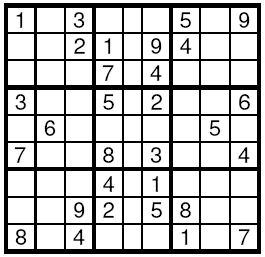|
Language:
Sudoku
Description
Sudoku is a very simple task. A square table with 9 rows and 9 columns is divided to 9 smaller squares 3x3 as shown on the Figure. In some of the cells are written decimal digits from 1 to 9. The other cells are empty. The goal is to fill the empty cells with
decimal digits from 1 to 9, one digit per cell, in such way that in each row, in each column and in each marked 3x3 subsquare, all the digits from 1 to 9 to appear. Write a program to solve a given Sudoku-task.
 Input
The input data will start with the number of the test cases. For each test case, 9 lines follow, corresponding to the rows of the table. On each line a string of exactly 9 decimal digits is given, corresponding to the cells in this line. If a cell is empty
it is represented by 0.
Output
For each test case your program should print the solution in the same format as the input data. The empty cells have to be filled according to the rules. If solutions is not unique, then the program may print any one of them.
Sample Input 1 103000509 002109400 000704000 300502006 060000050 700803004 000401000 009205800 804000107 Sample Output 143628579 572139468 986754231 391542786 468917352 725863914 237481695 619275843 854396127 Source
数独问题,直接暴搜,不知道问什么正着搜超时,倒着搜就过了。。。。
代码:
|
||||||||||
#include <iostream>
#include <cstdio>
#include <cstring>
#include <algorithm>
#include <cmath>
#include <string>
#include <map>
#include <stack>
#include <vector>
#include <set>
#include <queue>
#pragma comment (linker,"/STACK:102400000,102400000")
#define maxn 1005
#define MAXN 2005
#define mod 1000000009
#define INF 0x3f3f3f3f
#define pi acos(-1.0)
#define eps 1e-6
typedef long long ll;
using namespace std;
bool ok; //标记是否已经找到一个解
int mp[10][10];
void dfs(int x,int y)
{
if (y==-1) //倒着搜
{
x--;
y=8;
}
if (x==-1&&y==8)
{
for (int i=0;i<9;i++)
{
for (int j=0;j<9;j++)
printf("%d",mp[i][j]);
printf("\n");
}
ok=true; //找到一组解就标记
return ;
}
if (!ok)
{
if (!mp[x][y])
{
for (int t=1;t<=9;t++)
{
int flag=1;
for (int i=8;i>=0;i--)
{
if (mp[x][i]==t)
{
flag=0;
break;
}
if (mp[i][y]==t)
{
flag=0;
break;
}
}
int xx=3*(x/3);
int yy=3*(y/3);
for (int i=0;i<3;i++)
{
for (int j=0;j<3;j++)
{
if (mp[xx+i][yy+j]==t)
{
flag=0;
break;
}
}
}
if (flag)
{
mp[x][y]=t;
dfs(x,y-1);
mp[x][y]=0;
}
}
}
else
dfs(x,y-1);
}
return ;
}
int main()
{
int i,j,cas;
scanf("%d",&cas);
while (cas--)
{
for (i=0;i<9;i++)
for (j=0;j<9;j++)
scanf("%1d",&mp[i][j]);
ok=false;
dfs(8,8);
}
return 0;
}
/*
1
103000509
002109400
000704000
300502006
060000050
700803004
000401000
009205800
804000107
*/
原文地址:http://blog.csdn.net/u014422052/article/details/39495389